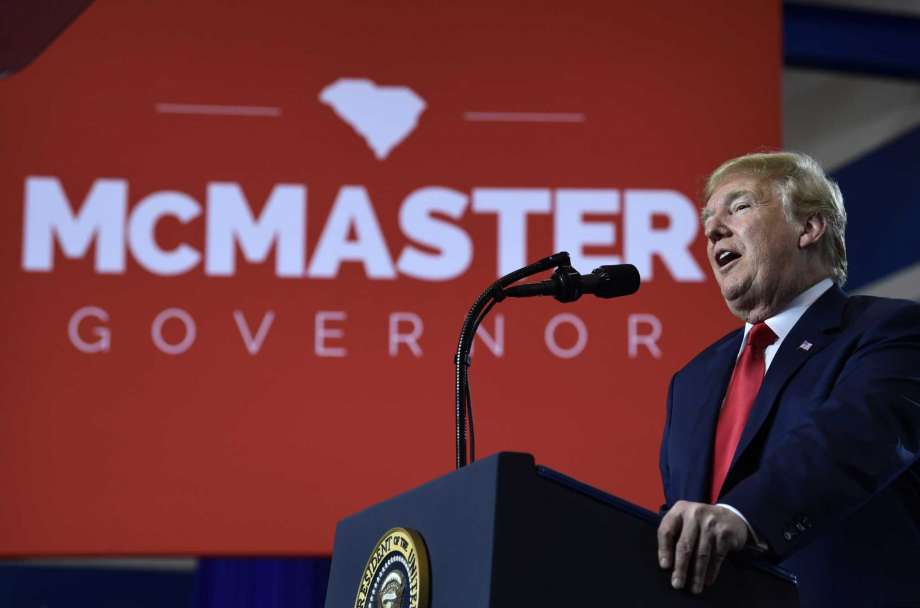Voters in seven states will decide the value of an endorsement by President Donald Trump, the fate of a convicted felon seeking to return to Congress and whether to loosen rules on marijuana.
Primary elections will take place Tuesday in Colorado, Maryland, New York, Oklahoma and Utah. South Carolina and Mississippi will hold runoffs to decide the Republican gubernatorial nominee.
A look at key races and themes:
WHITE HOUSE GOES ALL IN FOR SOUTH CAROLINA’S McMASTER
When he was lieutenant governor, Henry McMaster provided crucial support to Trump as he sought the 2016 GOP nomination. McMaster is governor now, and Trump has made a priority of returning the favor.
The president repeatedly praised McMaster on Twitter over the past week and visited the state Monday to stump for the governor. Vice President Mike Pence also campaigned for McMaster over the weekend.
Trump remains popular among South Carolina Republicans, but there’s notable grassroots support for McMaster’s challenger, businessman John Warren, who has argued that he is the most authentic Trump-aligned conservative in the race. The outcome will test whether it’s more important to have Trump’s endorsement or share his profile as an outsider businessman.
———
IN NEW YORK, A FELON FOR THE HOUSE?
Rep. Daniel Donovan is trying to avoid becoming the third House Republican to lose a primary this year. His rival, former Rep. Michael Grimm, wants to return to Congress following a stint in federal prison for felony tax evasion. The GOP establishment is worried a Grimm win Tuesday could jeopardize an otherwise safe seat.
True to rough-and-tumble Staten Island politics, Grimm mocks Donovan for bunking in his Capitol Hill office and “sleeping on the job.” Donovan has called Grimm a “hothead.” In 2014, Grimm told a reporter that he would throw him off a balcony as a camera captured the threat.
More importantly, the matchup is another Republican display of Trump’s sometimes-confusing imprint on the party. Grimm hammered Donovan as a moderate unworthy of the Trump GOP, most notably when Donovan voted against the GOP tax cuts last year. Yet Trump has endorsed Donovan, who also has enjoyed an outside advertising boost from the U.S. Chamber of Commerce, which typically steers clear of GOP primaries.
Beyond metro New York City, Democrats will pick nominees in four upstate Republican districts that could be competitive in November. New Yorkers will return to the polls in September to decide statewide primary races.
———
ROMNEY RETURNS
Two presidential campaigns ended in defeat, so now Mitt Romney is making a play for the U.S. Senate. He’s the heavy favorite in Tuesday’s Republican primary — and certainly for the November general election in the staunchly conservative state.
But he’s still delicately navigating the specter of Trump, penning a weekend op-ed in The Salt Lake Tribune explaining his approach to a president he derided during the 2016 campaign as a “con man” and “phony” bent on “absurd, third-grade theatrics.”
Romney, who later dined with Trump in apparent hopes of becoming secretary of state, wrote that as a senator he’d “support the president’s policies when I believe they are in the best interest of Utah and the nation.” But he said he “will continue to speak out when the president says or does something which is divisive, racist, sexist, anti-immigrant, dishonest or destructive to democratic institutions.”
———
MARYLAND’S DEMOCRATIC MELEE: A WINDOW INTO 2020
If you want a preview of Democrats’ wide-open 2020 presidential nominating fight, look to Maryland, where a gaggle of candidates is vying to take on Gov. Larry Hogan, the rare GOP executive in a Democratic-leaning state.
There’s no runoff in Maryland, so whoever leads the eight-candidate field will emerge as the nominee. The apparent front-runners, Prince George County executive Rushern Baker and former NAACP chief Ben Jealous, are both African-Americans; there have been just two black governors in American history.
———
THE LEFT TRIES AGAIN IN COLORADO
Liberal activists in the mold of Bernie Sanders have had a mixed record in the 2018 primaries, with Democratic voters seemingly tacking leftward on issues like health care and guns, but doing it by embracing establishment-backed liberals rather than the most liberal options on the ballot.
That trend will be tested again in two Denver-area congressional primaries.
Attorney and former Army Ranger Jason Crow is the Democratic Party favorite for a seat now held by Republican Mike Coffman. But Levi Tillemann is trying to capitalize on activists’ lingering frustrations with party leaders after he leaked a recording of a December 2017 conversation in which the House’s No. 2 Democrat, Steny Hoyer of Maryland, urged him to quit the race.
In a more liberal district nearby, Rep. Diana DeGette, a 22-year incumbent and the only woman in the Colorado delegation, faces a rare primary challenge from the left. Saira Rao, a former Wall Street lawyer who is of Native American descent, calls herself a “true blue” Democrat. She’d be the first nonwhite woman to represent Colorado in Congress.
———
POT (IN SOME FORM) FOR THE SOONERS?
Oklahoma voters will decide whether to legalize the cultivation, possession and use of marijuana for medicinal purposes. Outgoing Gov. Mary Fallin, a conservative Republican, isn’t a fan, saying the language “basically allows recreational marijuana.”
Fallin says she expects to call a special legislative session to adopt regulation if the measure passes. But enforcing the rules for any new marijuana market will be left to Fallin’s successor.
Republicans have 10 candidates vying for the job, all but ensuring an Aug. 28 runoff. Leading contenders include former Oklahoma City Mayor Mick Cornett, state Auditor Gary Jones, Lt. Gov. Todd Lamb, trial attorney Gary Richardson and Tulsa mortgage company founder Kevin Stitt.
A runoff between Cornett, a moderate who once led the U.S. Conference of Mayors, and Lamb, a staunch conservative, could set up a compelling intraparty tussle.
(AP)











